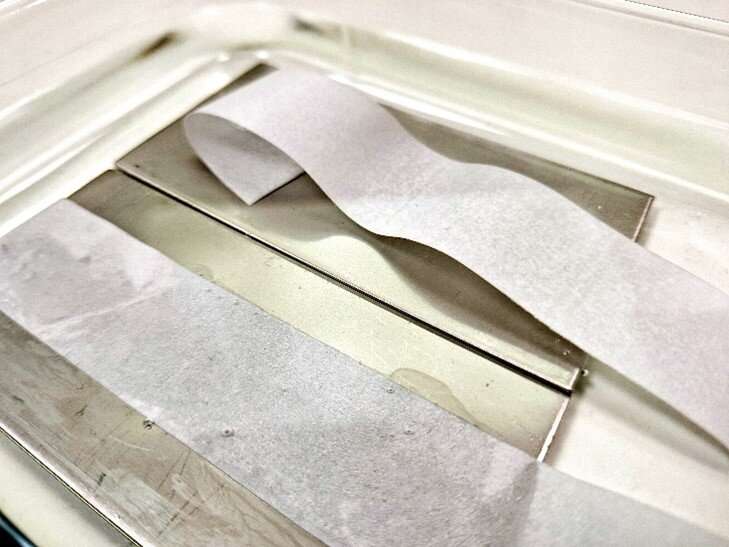This article has been reviewed according to Science X's editorial process and policies. Editors have highlighted the following attributes while ensuring the content's credibility:
fact-checked
peer-reviewed publication
trusted source
proofread
Solving industry's sticky recycling issues

Adhesive residue left on recyclable materials, such as glass and cardboard, can now be dissolved thanks to the introduction of degradable polymers created by University of Surrey scientists.
Sticky residue causes problems in the recycling industry, ranging from low-quality products, blocked water systems and even damaged recycling machinery.
The newly invented adhesive, very similar to that used on commercial packaging tape, has a chemical additive known as thionolactone which makes up 0.25% of the composition. This additive allows the adhesive to be dissolved in the recycling process, something which was previously not possible. Labels can also be detached up to 10 times faster when compared to a non-degradable adhesive. The findings are published in the journal Angewandte Chemie International Edition.
Professor Joseph Keddie, Leader of the Soft Matter Physics laboratory at the University of Surrey and fellow of the Surrey Institute for Sustainability, said, "Adhesives are made from a network of chain-like polymer molecules, irreversibly linked them together, which leads to the residue build-up we see left behind when recycling materials such as glass and cardboard.
"The problem of network residues is frustrating on an industrial scale and consequences of insoluble adhesives on the quality of recycled products are of even greater concern. Our solution offers the promise of less challenging and more cost-effective recycling.
"Our additive creates what we call degradable thioester connections in the polymer network and provides an innovative solution to making recycling processes residue free."
Dr. Peter Roth, Senior Lecturer of Polymer Chemistry at the University of Surrey, and fellow of the Surrey Insitute for Sustainability added, "While other degradable adhesives exist, there are none which resemble what is currently used industry-wide in their chemical make-up. We are proving it is possible to use similar adhesives and show that a simple additive has the potential to increase the quality of recycled materials such as glass and cardboard.
"The next steps would be to look at the commercial viability of this additive, as well as look at the sustainability impact."
So far, the adhesive has been tested on glass, steel, plastic and paper, including cardboard.
Rohani Abu Bakar is the lead Ph.D. student working on this project. She commented on the impact this will have when she returns to Malaysia. "The interdisciplinary approach across chemistry and physics has been incredibly useful in building the knowledge and skills to solve a very real sustainability problem. There is no doubt that many countries across the world need to review how they recycle major materials, and this brings us one step closer to reaching our sustainability goals on an industrial scale," she said.
More information: Rohani Abu Bakar et al, Degradable, Ultraviolet‐Crosslinked Pressure‐Sensitive Adhesives Made from Thioester‐Functional Acrylate Copolymers, Angewandte Chemie International Edition (2023). DOI: 10.1002/anie.202307009
Journal information: Angewandte Chemie International Edition
Provided by University of Surrey





















